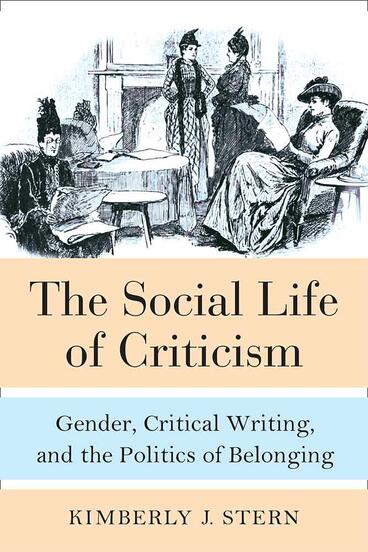The Social Life of Criticism
Gender, Critical Writing, and the Politics of Belonging
Contends that gender politics were influential in the early development of literary criticism and the writings of female critics
Description
The Social Life of Criticism explores the cultural representation of the female critic in Victorian Britain, focusing especially on how women writers imagined themselves—in literary essays, periodical reviews, and even works of fiction—as participants in complex networks of literary exchange. Kimberly Stern proposes that in response to the “male collectivity” prominently featured in critical writings, female critics adopted a social and sociological understanding of the profession, often reimagining the professional networks and communities they were so eager to join.
This engaging study begins by looking at the eighteenth century, when critical writing started to assume the institutional and generic structures we associate with it today, and examines a series of case studies that illuminate how women writers engaged with the forms of intellectual sociability that defined nineteenth-century criticism—including critical dialogue, the club, the salon, and the publishing firm. In doing so, it clarifies the fascinating rhetorical and political debates surrounding the figure of the female critic and charts how women writers worked both within and against professional communities. Ultimately, Stern contends that gender was a formative influence on critical practice from the very beginning, presenting the history of criticism as a history of gender politics.
While firmly grounded in literary studies, The Social Life of Criticism combines an attention to historical context with a deep investment in feminist scholarship, social theory, and print culture. The book promises to be of interest not only to professional academics and graduate students in nineteenth-century literature but also to scholars in a wide range of disciplines, including literature, intellectual history, cultural studies, gender theory, and sociology.
Kimberly J. Stern is Assistant Professor of English at The University of North Carolina at Chapel Hill.
Reviews
“This is destined to be an influential—even a foundational—study that will open up new and exciting vistas in the study of post-Enlightenment criticism and cultural community.”—Stephen Behrendt, University of Nebraska–Lincoln
“This is one of those valuable books that keeps in view the implications of its arguments for the gender politics of intellectual culture today even as it presents, in fine and full detail, a sophisticated social and historical understanding of female critical consciousness in the nineteenth century.”
—Elizabeth Langland, Arizona State University

